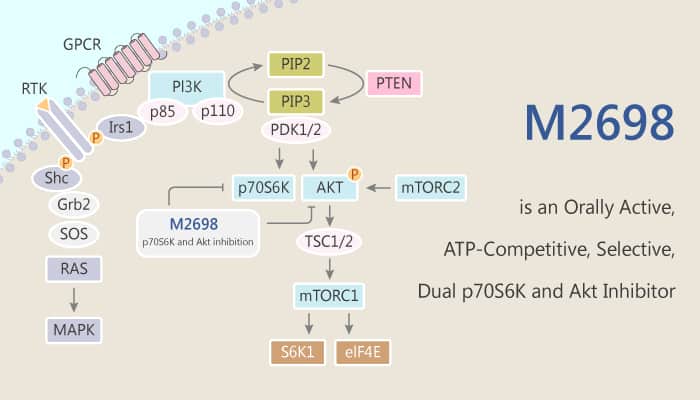The disorder of PI3K/Akt/mTOR (PAM) signaling pathway occurs in about 30% of human cancers, making it a reasonable target for new therapies. Specifically, the pathway is an important regulator of growth, proliferation, and metabolism. However, some PAM pathway inhibitors, such as Rapamycin complex (mTORC) rapalogs, cause the impairment of compensatory feedback circuits that lead to Akt activation. Besides, the incidence of PI3K Signal abnormalities in glioblastoma and breast cancer is particularly high. Therefore, the inhibition of the PAM pathway signal is a very attractive prospect for new anti-cancer therapy. Moreover, Rapamycin complex 1 (mTORC1) is a mammalian target of rapamycin against everolimus for the treatment of hormone receptor-positive. The signals sent by the PAM pathway lead to the activation of P70S6K, which directly affects the growth and survival of cells. M2698 (MSC2363318A) is an orally active, ATP competitive, selective p70S6K and Akt dual-inhibitor with anti-cancer activity.

But, how does M2698 protect against cancer cells via p70S6K and Akt? Let’s discuss it in detail. In the beginning, M2698 (MSC2363318A) is an orally active, ATP competitive, selective p70S6K and Akt dual-inhibitor with IC50s of 1 nM for p70S6K, Akt1, and Akt3. In addition, M2698 inhibits indirectly pGSK3β (IC50=17 nM) and pS6 (IC50=15 nM). Meanwhile, M2698 inhibits proliferation in a dose-dependent manner in breast tumors cell lines with IC50s of 0.02-8.5 µM. Nonetheless, M2698 inhibits p70S6K activity and induces feedback loop phosphorylation on Akt and suppresses Akt activity in breast cancer cell lines. Importantly, M2698 can cross the blood-brain barrier. M2698 results in dose-dependent inhibition of tumor growth and tumor regression with the highest dose of 30 mg/kg. All in all, M2698 is an orally active, ATP competitive, selective p70S6K and Akt dual-inhibitor.
References:
Machl A, et al. Am J Cancer Res. 2016 Mar 15;6(4):806-18.